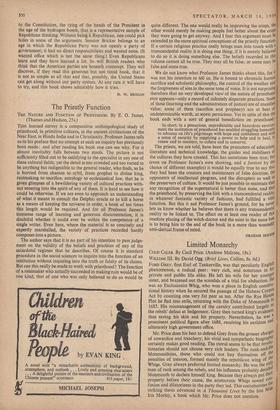The Priestly Function
THE NATURE AND FUNCTION OF PRIESTHOOD. By E. 0. James. (Thames and Hudson, 25s.)
Tins learned survey is a comparative anthropological study of priesthood, in primitive cultures, in the ancient civilisations of the Near East, in Hindu India and in Christianity. Professor James tells us in his preface that no attempt at such an inquiry has previously been made : and after reading his book one can see why. For it almost inevitably falls between two stools. The picture is not sufficiently filled out to be satisfying to the specialist in any one of these cultural fields; yet the detail is too crowded and too varied to be anything but indigestible to the general reader, who finds, as he is hurried from shaman to sybil, from prophet to divine king, rainmaking to sacrifice, astrology to ecclesiastical law, that he is given glimpses of a bewildering variety of cultural practices with- out entering into the spirit of any of them. It is hard to see how it could be otherwise. If we are even to approach an understanding of what it meant to consult the Delphic oracle or to kill a horse as a means of keeping the universe in order, a book of ten times this length would be required. And for all Professor James's immense range of learning and generous documentation, it is doubtful whether it could ever be within the competence of a single writer. Even here, where the material is so concisely and expertly marshalled, the variety of practices recorded hardly composes into a picture.
The author says that it is no part of his intention to pass judge- ment on the validity of the beliefs and practices of any of the sacerdotal regimes that he describes. Of course it is standard procedure in the social sciences to inquire into the function of an institution without inquiring into the truth or falsity of its claims. But can this really be made to work with priesthood? The function of a rainmaker who actually succeeded in making rain would be of one kind; that of one who was only believed to do so would be other would merely be making people feel better about the crops they were going to get anyway. And I fear this argument must be
extended to the more spiritual conceptions of the priestly function. If a certain religious practice really brings man into touch with a transcendental reality it is doing one thing; if it is merely believed to do so it is doing something else. The beliefs recorded in this
volume cannot all be true. They may all be false; or some may be false and some true.
We do not know what Professor James thinks about this, for it was not his intention to tell us. He is bound to chronicle human • sacrifice and scholastic philosophy, the control of the weather and the forgiveness of sins in the same tone of voice. It is not surprisin$ therefore that no very developed view' of the nature of priesthood ever appears—only a record of infinitely disparate practices. Some of these (learning and the administration of justice) are of manifest value; some of them (sacrifice and prophecy) are at best of undeterminable worth, at worst pernicious. Yet in spite of this the book ends with a sort of general benediction on priesthood:
In short, in a precarious, unpredictable and hazardous environ' ment the institution of priesthood has enabled struggling humanitY to advance on life's pilgrimage with hope and confidence and with a sense of security by supplying a power to help and to heal, to renew and to reassure, to cohere and to conserve.
The priests, we are told, have been the promoters of education, literature and technical knowledge, the guides and stabilisers of
the cultures they have created. This has sometimes been true; but
(even on Professor James's own showing, and a fortiori by the choice of different examples) it would be equally true to say that they had been the creators and maintainers of false doctrine, the opponents of intellectual progress, and the disrupters as well as the preservers of culture. It would be just possible to maintain that any recognition of the supernatural is better than none, and that the priesthood, by preserving the link with a transcendental reality, in whatever fantastic variety of fashions, had fulfilled a vital function. But this it not Professor James's ground, for he nevdr, lets us know whether he believes that there is any transcendental
reality to be linked to. The effect on at least one reader of this resolute placing of the witch-doctor and the saint in the same box is to bring him to the end of the book in a more than wontedly anti-clerical frame of mind.
GRAHAM HOIJOI/


































 Previous page
Previous page